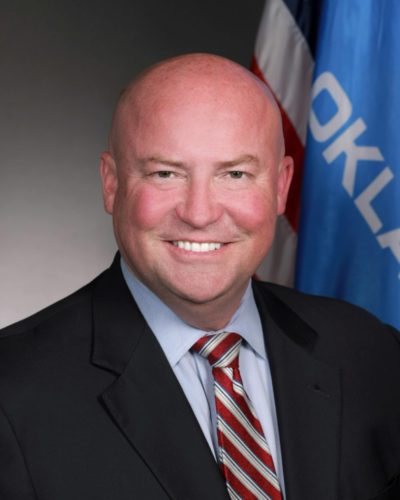By Oklahoma Institute for Child Advocacy CEO Joe Dorman
Government functions best when different branches, elected officials and agencies maintain good working relationships. To his credit, Governor Kevin Stitt understands the value of maintaining collegial relationships with the Legislature and his efforts seem to be generating wins for his administration. Last week, the governor and a large group of Senators and Representatives held a large joint press conference announcing a reform package aimed at consolidating accountability for executive agencies (and power over those agencies) in the governor’s office.
The new plan gives the governor the ability to hire and fire the directors of five state agencies: the Department of Corrections, the Oklahoma Health Care Authority, the Office of Juvenile Affairs, the Department of Mental Health and Substance Abuse Services and the Department of Transportation. Governor Stitt campaigned on this, arguing that the state’s chief executive needs to be given more power to directly influence policy within executive agencies.
The reform package also gives the Legislature additional appointments on the boards that oversee those agencies and makes those appointments “at will,” meaning they can be removed at any time by the appointing authority – whether it is the governor, speaker of the House or the president pro tempore of the Senate.
In addition to legislative action on agency reform, lawmakers have also been making progress on criminal justice reform. Two justice reform measures, House Bill 2218 and House Bill 2310, passed off the House floor last week and are now going to the Senate.
HB 2218 is a comprehensive bill that would allow courts to waive fines, fees and court costs for certain indigent defendants, for those who are enrolled in a technical school, workforce training program or college or university and for those who work at least 40 hours per week. The bill also allows defendants under probation supervision to earn credit for compliance that would reduce the length of their supervision.
The measure requires a court to hold a hearing to establish a payment plan for defendants who have been ordered to pay fines, court costs and fees. The court would use a formula to establish the amount of the defendant’s discretionary income and set the repayment at no more than 10 percent of the discretionary income amount. The bill requires the court to consider the employment of the defendant and allows the court to order the defendant to serve weekends in lieu of revocation.
House Bill 2310 removes a jury’s exclusive authority to recommend punishment at jury trial. The bill would allow a person convicted of a crime to select either the jury or the judge to hand down a sentence.
In addition, at least another 17 criminal justice bills have either been published to be heard in the House and Senate or are eligible to be published. OICA is engaged in discussions regarding one of these bills, the Failure to Protect legislation, run as House Bill 2523 by Rep. Tammy West. We are encouraged by her effort to ensure that people who cause harm, or allow harm to be done, to children will receive a just punishment.
A bill that would require the Department of Human Services to assess children upon being taken into custody passed this week also. House Bill 1075 would require DHS to provide every child taken into custody an assessment of his or her physical, medical, mental health and educational needs and would require the assessment be updated at regular intervals while the child is in the department’s custody.
Thursday (3/14) is the third reading deadline for bills and resolutions to be heard in the chamber of origin, which means all House and Senate bills must be heard by Thursday at midnight to stay alive for the current legislative session. That means lawmakers will be working late nights this week in an effort to hear hundreds of remaining bills.


